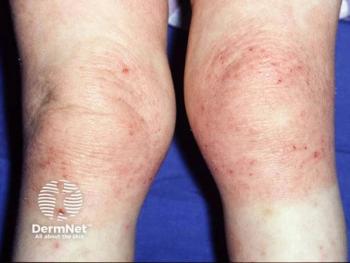
Unmet Needs in the Treatment of Atopic Dermatitis
Diego Ruiz Dasilva, MD, FAAD, reviews the unmet needs and barriers in the treatment landscape of atopic dermatitis.
Episodes in this series

Diego Ruiz Dasilva, MD, FAAD: Next, I wanted to talk a bit about the landscape treatment, things that are changing, some remaining unmet needs, as well as limitations that physicians and practitioners face when selecting a treatment. And so, at this point, I feel like the main limitations are truly a lack of experience, common knowledge, and comparative data. So yes, there are still unmet needs; however, the main problem is that these patients are being strung along on topical or oral treatments and immune suppressants because many providers don’t understand or are not aware of the newer medications nor have used them enough to become comfortable with them. I hope and anticipate as time goes on clinicians will become more comfortable with all the newer treatment options and be able to tailor the treatment to patients’ particular lifestyle and preferences.
I also hope that insurance coverage barriers will continue to improve so patients can receive these safer treatments in a more timely fashion. I’d love to see therapies that have the efficacy of an oral JAK [Janus kinase] inhibitor similar to what you’re on but can be taken less frequently, perhaps, or maybe don’t require any bloodwork monitoring. That’d be fantastic. And if the psoriasis world was any indication, innovation is going to continue to take us in that direction in the atopic dermatitis world, which is really exciting.
I wanted to mention one last thing, which I talked about throughout the whole program. It’s just how amazed I am as a doctor to see how far treatments have come and how we can provide this relief that Trinity is talking about, within days of feeling better. I remember the old days, being a medical student and practicing early on when it was like, here is this treatment, let’s say, for severe atopic dermatitis. Not only is it an immune suppressant that can cause a host of all these adverse effects, infections, cancers, heart attacks, whatever, but also it’s going to take months before we know whether it’s working or not. And you have to just trust me that it’s going to work at some point and just take this medicine every day and not be feeling any less itchy, or eczema is still going to be prominent on your skin. And it was so frustrating in that era to treat patients. So, to be where we are now and imagine the future is really exciting for me. I’m really happy to be able to help these patients who are suffering.
I wanted to close by saying thank you all for watching this Dermatology Times®patient journey program. If you enjoyed this conversation, please subscribe to our e-newsletters to receive upcoming programs and other great content right in your inbox, and have a good day.
Transcript edited for clarity
Newsletter
Like what you’re reading? Subscribe to Dermatology Times for weekly updates on therapies, innovations, and real-world practice tips.















